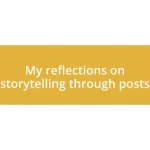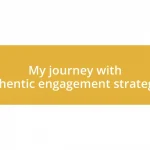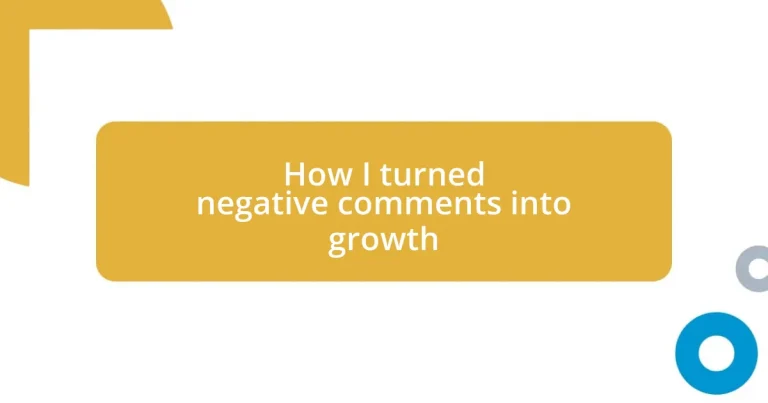Key takeaways:
- Negative comments can reveal insights about the commenter’s insecurities, encouraging empathy rather than defensiveness.
- Shifting perspective from viewing feedback as criticism to seeing it as growth opportunities can transform reactions.
- Engaging with feedback constructively, such as seeking clarification and practicing gratitude, fosters personal development.
- Tracking progress and celebrating achievements enhances motivation and reinforces personal growth milestones.
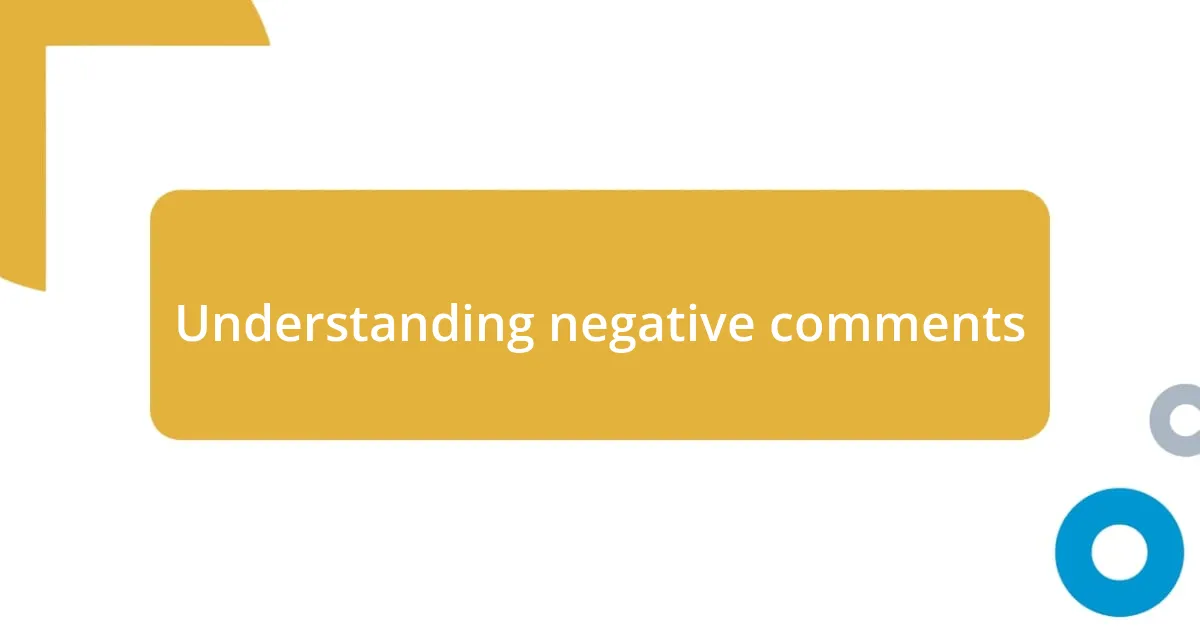
Understanding negative comments
Negative comments can sting, and I’ve felt that sting more times than I care to admit. I remember a time when I shared a piece of my work online and received harsh critiques that felt personal. It’s easy to see these comments as attacks, but I learned that they often reflect more about the commenter than about us.
When I delve deeper into negative feedback, I ask myself why it affects me so much. Perhaps it taps into my insecurities or my desire for approval. I realize that my reaction is valid, but the comments themselves can be an opportunity for growth if I can sift through the emotions they stir up.
Understanding negative comments requires a shift in perspective. Instead of viewing them solely as criticism, I’ve started to see them as potential stepping stones. For instance, a recent comment pointed out a flaw I had overlooked. Instead of feeling defeated, I embraced it as a chance to improve my craft. Isn’t it interesting how a little shift in mindset can transform the way we perceive feedback?
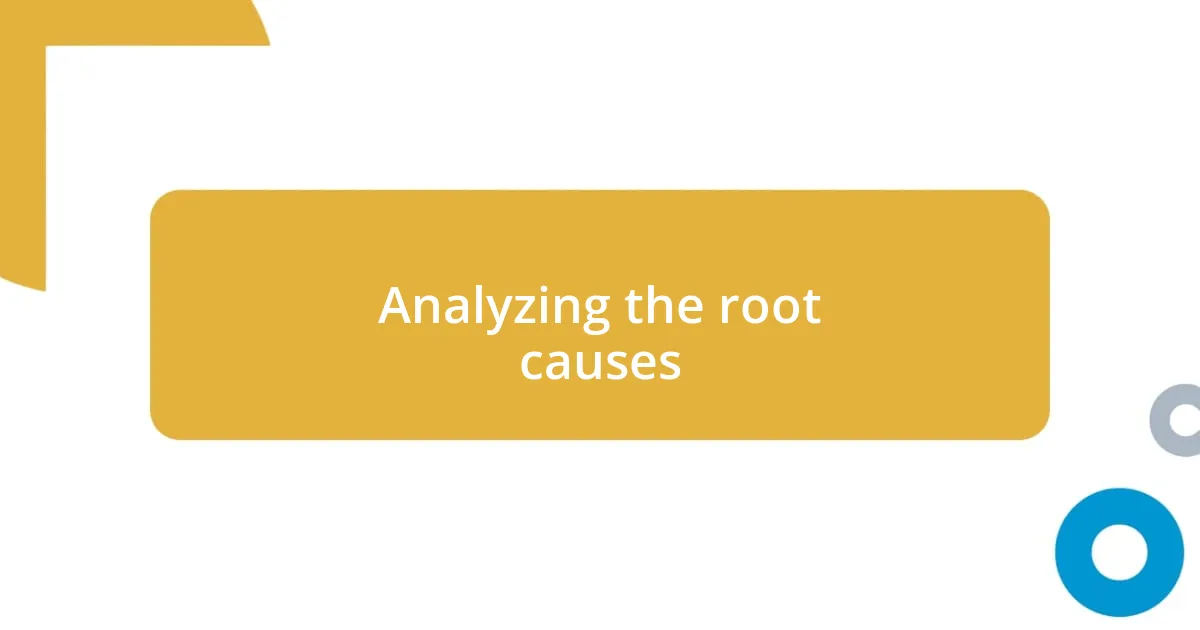
Analyzing the root causes
When analyzing the root causes of negative comments, I often find they stem from unmet expectations—either my own or those of the commenter. For example, I once received negative feedback after a presentation that I felt was my best work yet. Diving deeper, I discovered that my audience had different expectations related to engagement, which ultimately caused their dissatisfaction. This realization shifted my focus from self-blame to understanding the expectations I needed to meet moving forward.
Another layer involves the personal experiences of the commenter. I remember feeling hurt by a remark that dismissed one of my favorite projects. Upon reflection, it dawned on me that the commenter might have been projecting their frustrations rooted in their own experiences. Such insights taught me that people’s reactions often reveal patches of their own insecurities and struggles—encouraging empathy rather than defensiveness.
Finally, I believe it’s crucial to consider context. Negative comments can arise from external factors in the commenter’s life—stress, fatigue, or even unrelated issues. I recall an instance where I received what felt like a barrage of negativity on social media, only to later learn the commenter was going through a tough time personally. Recognizing this context helped me maintain a healthier emotional distance, allowing me to see the comment as a moment in someone else’s life rather than a reflection of my worth.
| Root Cause | Description |
|---|---|
| Unmet Expectations | Comments reflect expectations that may differ from my intent or style. |
| Personal Experiences | Commenters project their own insecurities and frustrations onto my work. |
| Contextual Factors | External issues in the commenter’s life can influence their reactions |
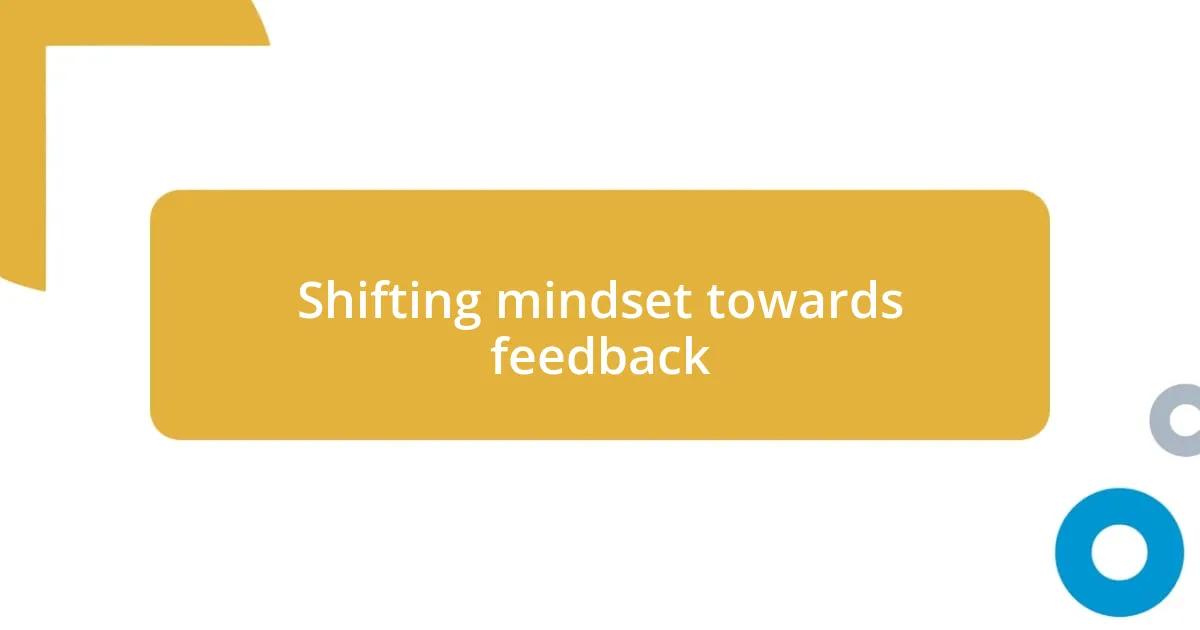
Shifting mindset towards feedback
Shifting my mindset towards feedback is undoubtedly a transformative journey. Instead of feeling like failure when faced with negative comments, I’ve learned to adopt a growth-oriented perspective. For example, when I encountered criticism on a project I was genuinely proud of, I initially felt crushed. Yet, as I reflected on the feedback, I understood it highlighted areas where I could elevate my work. I realized that embracing this perspective can redefine how I approach criticism, transforming it into a valuable learning experience.
- Reframe the Narrative: Instead of seeing feedback as an attack, I view it as a tool for improvement.
- Seek Out Specifics: I ask for clarity on vague comments to gain actionable insights; it helps me focus on what truly matters.
- Practice Gratitude: I remind myself that each piece of feedback, even the negative ones, contributes to my growth journey.
With every interaction, I find that shifting my perspective allows me to open a dialogue rather than shutting it down. I think about the time a colleague pointed out my repetitive phrasing. At first, I felt defensive, but then I saw it as a chance to refine my language and enhance my communication skills. The more I lean into such feedback, the more I uncover layers of my potential that I had previously overlooked.
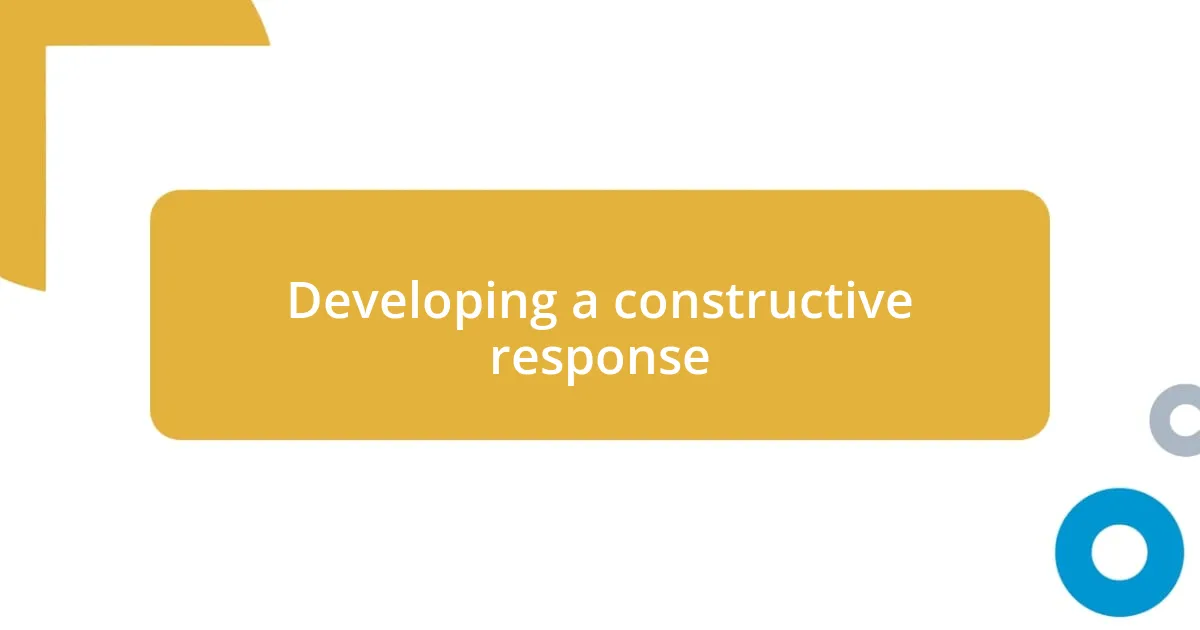
Developing a constructive response
When I first encountered negative comments, my instinct was to respond defensively. Over time, I learned that a more constructive approach was to take a step back and ask myself, “What can I learn from this?” For instance, after receiving a harsh critique on a blog post, instead of firing back with my own frustrations, I compiled the feedback and set aside time to reflect on it. This shift transformed the way I viewed criticism from an attack to an opportunity for growth.
I also realized that actively engaging with the commenter can foster a more constructive response. One unforgettable moment was when I engaged with a reader who criticized my writing style. Rather than ignoring their feedback, I reached out for clarification. This exchange not only deepened my understanding but also formed a connection that turned a negative encounter into a meaningful dialogue. Isn’t it fascinating how a little curiosity can lead to unexpected insights?
Lastly, it’s essential to remember that constructive responses often involve gratitude. A while ago, I received feedback that initially stung—a colleague suggested I improve my public speaking skills. I fought the urge to brush it off, instead choosing to thank them for their honesty. This simple act of appreciation helped me channel my emotions positively, and I found myself enrolling in a speaking workshop shortly after. Embracing feedback with gratitude can be incredibly empowering, as it transforms feelings of inadequacy into motivation.
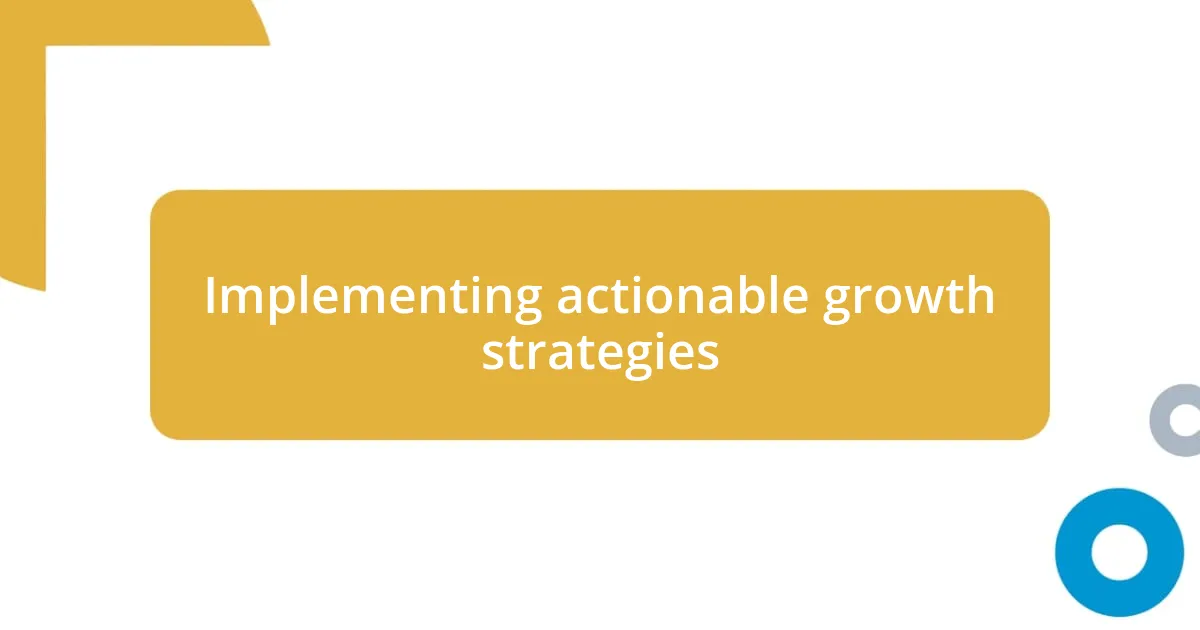
Implementing actionable growth strategies
Implementing actionable growth strategies starts with setting clear and attainable goals based on the feedback I receive. For instance, when I was advised to improve my time management skills, I didn’t just nod and move on. Instead, I created a weekly schedule, allocating specific time blocks for tasks. This simple strategy turned overwhelming feedback into manageable steps that I could track.
Another powerful strategy is seeking external support, whether it be from mentors or peers. I remember reaching out to a trusted colleague after receiving some particularly tough feedback on my project presentation. They offered not only a fresh perspective but also actionable tips that I could implement immediately. This collaboration turned a solitary struggle into a joint effort, which made the growth process feel less daunting and more enriching.
Finally, I can’t stress enough the value of reflection. After implementing feedback, I take time to assess what worked and what didn’t. Recently, after adjusting my writing style based on criticism, I revisited my previous posts to compare them with my current work. The progress was startling! This practice not only reinforces my growth but also boosts my confidence as I see tangible improvements, reminding me that change is possible with effort and determination. Have you ever taken a step back to reflect on your own progress? It’s truly rewarding.
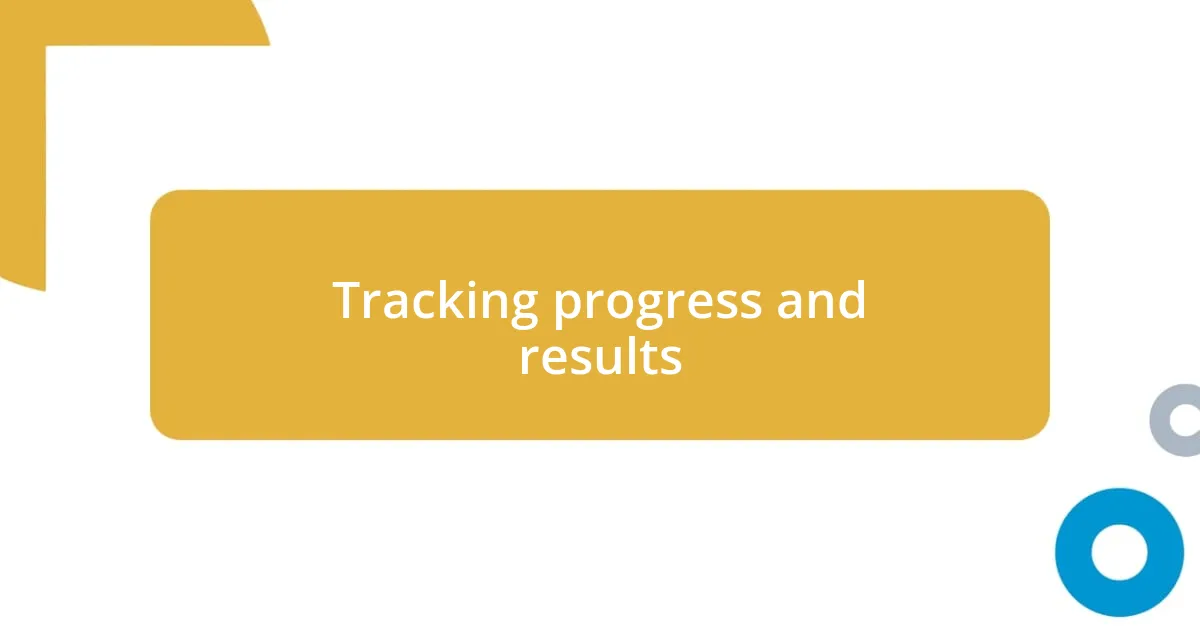
Tracking progress and results
Tracking progress is not just about marking off accomplishments; it’s about understanding the journey. I often jot down reflections in a journal, noting how I felt about the feedback I received and the steps I took afterward. Reviewing these entries can be eye-opening. Have you ever experienced that moment when you look back and realize just how far you’ve come? It’s empowering!
Quantifying results also plays a crucial role in tracking progress. For example, after implementing advice to improve my social media presence, I began keeping a close eye on engagement metrics. Watching my follower count steadily rise wasn’t just numbers; it was a validation of my efforts and a reminder that every small change mattered. Have you ever felt motivated by your own statistics? The data can tell such a rich story!
I’ve learned that discussions with peers can provide invaluable insights into my growth. I’ve had numerous coffee catch-ups with friends who’ve faced similar challenges; sharing our experiences brought clarity and affirmation. Sometimes, they point out progress I didn’t even notice myself, like how I’ve become more confident in voicing my opinions in meetings. Ever had that revelation when a friend highlights something you take for granted? It’s those moments that really make me appreciate the journey of growth.
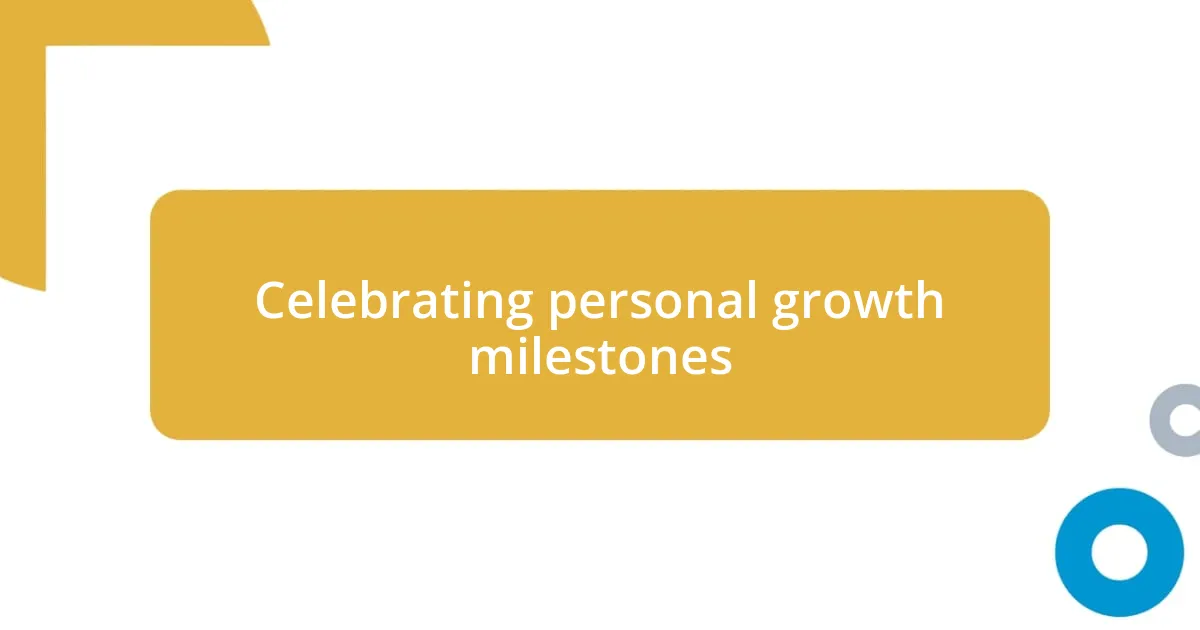
Celebrating personal growth milestones
Milestones in my personal growth journey often deserve a celebration, and I find that these moments transform feedback into motivation. Recently, after completing a key project that incorporated constructive criticism, I decided to treat myself to a little celebration—a day off to indulge in my favorite activities. Have you ever set aside time to celebrate your wins, no matter how small? It reinforces the idea that every step forward is a triumph deserving recognition.
Reflecting on my past challenges, I remember when I improved my public speaking skills after receiving tough feedback. I was terrified before my first big presentation, but once I received positive responses afterward, it felt monumental. To mark this achievement, I invited friends for a small gathering, sharing my story and reinforcing my commitment to growth. It’s incredible how sharing our milestones can enhance our sense of accomplishment, don’t you think?
What truly resonates with me is how each celebration leads to deeper connections with others. I once organized a casual dinner with colleagues after we collectively tackled a tough project, and it turned into a night filled with laughter and shared experiences. Celebrating our achievements not only adds joy but also strengthens our bonds. Reflecting on those moments, I realize that personal growth is just as much about the relationships we cultivate along the way. How have your celebrations fostered connections in your life?







